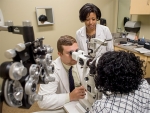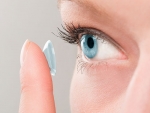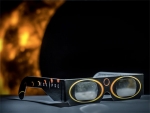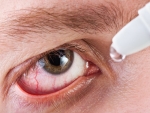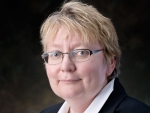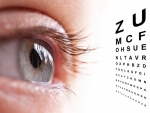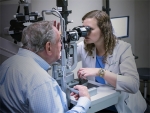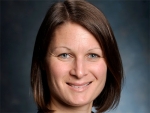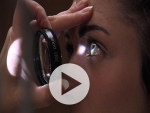Displaying items by tag: school of optometry
Tagged under
UAB’s annual Gift of Sight program provides free eye care to underinsured Birmingham residents for the holiday season.
Tagged under
UAB’s student body grew nearly 7 percent year-over-year with gains in every school, the College of Arts and Sciences, and the Honors College. UAB also enrolled its largest and most academically prepared freshman class.
Tagged under
Patients, students, faculty and staff joined together at the University of Alabama at Birmingham School of Optometry to view the 2017 solar eclipse.
Tagged under
Andrew D. Pucker, O.D., Ph.D., gives tips on safe use of contact lenses, including advice on travel, swimming and UV rays.
Tagged under
Nearly 1,400 students will graduate this summer, including 90 who will receive the university’s highest degrees. An estimated 850 will walk in the commencement ceremony.
Tagged under
 A UAB optometrist and ophthalmologist provide advice on how to protect your eyes while viewing the solar eclipse.
A UAB optometrist and ophthalmologist provide advice on how to protect your eyes while viewing the solar eclipse.
Tagged under
Works of art created by children with visual impairments, blindness and deaf blindness are on exhibition at The Edge of Chaos at UAB, and some works are available for purchase.
Tagged under
UAB personalizes treatment for dry eye patients with the expansion of clinic and development of guidelines for diagnosis and treatment.
Tagged under
Benoit is a seasoned educator, communicator and administrator who comes to UAB from Ohio University, where she was executive vice president and provost for almost eight years.
Tagged under
Brian Samuels, M.D., says there is an increase of eye pressure throughout the morning, and that pressure comes and goes throughout the day. This fluctuation is a known risk factor for the progression of glaucoma.
Approximately 14 million Americans have age-related macular degeneration, and a new study suggests it may be underdiagnosed in primary eye care settings.
Tagged under
Ongoing multidisciplinary concussion research will be highlighted at an upcoming symposium at UAB: The Concussion Collaborative Science Symposium 2017: Objectively Tackling Concussion through Vision, Science, Radiology and Engineering.
Tagged under
- release
- concussion
- school of optometry
- vision science research center
- school of medicine
- department of radiology
- department of neurology
- school of engineering
- department of pediatrics
- college of arts and sciences
- department of psychology
- vorclinic
- department of pediatric optometry
- division of advanced medical imaging
- department of ophthalmology and visual sciences
 At least 2,015 students will graduate and approximately 1,250 are expected to walk in the spring 2017 commencement ceremonies happening 9:30 a.m. and 2:30 p.m. Saturday, April 29, at Bartow Arena.
At least 2,015 students will graduate and approximately 1,250 are expected to walk in the spring 2017 commencement ceremonies happening 9:30 a.m. and 2:30 p.m. Saturday, April 29, at Bartow Arena.
Tagged under
- college of arts and sciences
- release
- collat school of business
- school of engineering
- school of education
- school of health professions
- graduate school
- school of dentistry
- school of medicine
- school of nursing
- school of optometry
- school of public health
- department of nutrition sciences
- department of english
- office of student involvement
- commencement
- university events
- university honors program
- oneal comprehensive cancer center
- international studies
A UAB optometrist has been recognized for outstanding leadership to students by the American Optometric Association.
Tagged under
The grand opening of the INTO UAB Center is a celebration of collaboration from faculty, staff and students to support international students who choose to make the university their home.
Tagged under
The new facility will be double the square footage of the current UABPD headquarters and provide a state-of-the-art, functionally efficient workspace designed to accommodate continued growth.
Tagged under
The daylong conference features former Alabama student and Huffington Post editor at large as the keynote speaker.
Tagged under
Lynn Hammonds, O.D., a graduate of the UAB School of Optometry, will serve as president of a globally recognized optometry association.
Tagged under
UAB School of Optometry and Department of Ophthalmology partner with UAB Athletics to provide better eye care to UAB student-athletes.
Tagged under

